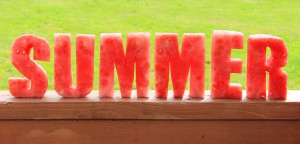Summer eating doesn’t have to be stressful. In fact, you can enjoy the sun, sand, heat and treats without adding to your waistline you worked hard for. Here is a list of common nutrition mistakes that most of us are guilty of making at times, and easy ways to fix them so you don’t have to stress this summer:
1. The mistake: Eating salty snacks
The problem: Salty snacks (think processed snack foods, particularly those in packages such as chips, pretzels, cookies, etc.,) cause bloat as your body retains water to help to dilute the salt. The result is an unpleasant swelling in your belly, face and extremities.
The fix: Swap chips, pretzels and other snack foods for a satisfying bite that doesn’t come in a package. Think crunchy veggies and crisp sliced apples. Choose a lower-calorie dip such as hummus and, whenever possible, choose low-sodium varieties. Or try Greek Yogurt Veggie Dip for veggies. Consider dipping apples in yogurt or in a dollop of nut butter, or munch on a single handful of crunchy almonds with the apple slices. Try roasted chickpeas or air-popped popcorn or frozen grapes with an ounce of low-fat cheese.
2. The mistake: Drinking too much alcohol
The problem: Beach vacations and cruises tend to provide many opportunities to indulge in alcohol, especially sugary drinks such as margaritas and piña coladas. But one seemingly innocent 10-ounce margarita could set you back more than 500 calories, nearly a third of the total amount of calories many women who are hoping to lose some weight should consume in an entire day. And tropical drinks often have similar calorie counts. Alcohol also tends to make you feel hungrier, thirstier and less concerned about what you’re eating. This is a triple whammy that can make you quickly pack on the pounds.
The fix: First, start with a plan. Before you start drinking, decide exactly how many alcoholic drinks you’ll have per day. Ideally, women should aim for one drink per day, and men should aim for no more than two. Simply setting a limit can help prevent you from overindulging. To help you to stick to your limit, start with a calorie-free beverage such as seltzer, and then alternate alcoholic beverages with non-caloric ones. Also, try to eat a bit lighter, healthier meals throughout the day to balance out the added calories from the alcohol.
3. The mistake: Indulging in too many sweet treats
The problem: Sweet treats are typically packed with calories and are often high in fat, as well. And an equally large problem is that sweets don’t keep you full, while giving you an energy rush followed by a crash. Energy dips often result the need for a quick pick-me up and an increased craving for even more sweets, so you end up overeating, often on junk food.
The fix: Take advantage of naturally occurring sweets to satisfy your sweet cravings. Naturally sweet foods without added sugar (think: fruits and treats made with them) are typically much lower in calories than those with added sweeteners. Plus, sweets from fruits are packed with nutrients. As veggie-loving registered dietitians who have a sweet tooth that we work hard to keep in check, we’re all too familiar with the temptation to cool off with cold, refreshing sweet treats such as ice cream, frozen yogurt and slushes. Having alternative fixes is what saves us from getting in over our heads. Blended frozen fruit or combined with yogurt or nut milks work wonders. If you’re feeling especially motivated, try cooling off with a large glass of fruit-infused water. Otherwise, a fresh fruit smoothie including a cup of berries, yogurt and add-ins such as cocoa, cinnamon or ginger can turn the flavor up a notch.
4. The mistake: Indulging in too many sweet treats
The problem: Because you sweat a bit more in the warmer months, you need to be mindful to replace the lost water. When you don’t properly rehydrate, you may feel lethargic, as water is needed to create energy. You also mistake thirst for hunger and overeat when you really just need a glass of water.
The fix: Be sure to eat plenty of veggies (they hydrate you) and aim to drink roughly half your body weight, in ounces—and even more if you’re spending time outside. So, if you weigh 150 pounds, aim to drink about 75 ounces of water daily. The good news is if you aren’t a fan of water, a little bit of flavor from fruits or veggies can add both variety and some extra vitamins as well.
5. The mistake: Crash dieting
The problem: Crash diets provide far too few calories to maintain adequate energy levels and too few nutrients for good health, so they typically create fatigue, grogginess and crankiness after the first few days. Plus, most crash diets backfire when they’re over, creating a quick rebound to a higher weight than before the diet started. If crash diets are your jam and your go-to for looking “swimsuit ready,” it’s time to try something new.
The fix: Focus on eating healthy, well-balanced meals by filling about half your plate with vegetables and rounding out one-quarter of your plate with wholesome carbs such as fruits and whole grains, and the other quarter with lean protein such as fish, pulses (legumes), and low-fat dairy or other calcium-rich foods. This way you’ll weed out the foods that aren’t good for health and that pack on pounds, while consuming a lower-calorie diet that fills you with health-promoting nutrients.
Adapted from: www.acefitness.org/blog/5989/5-nutrition-mistakes-to-avoid-this-summer


Leave a Reply
Want to join the discussion?Feel free to contribute!